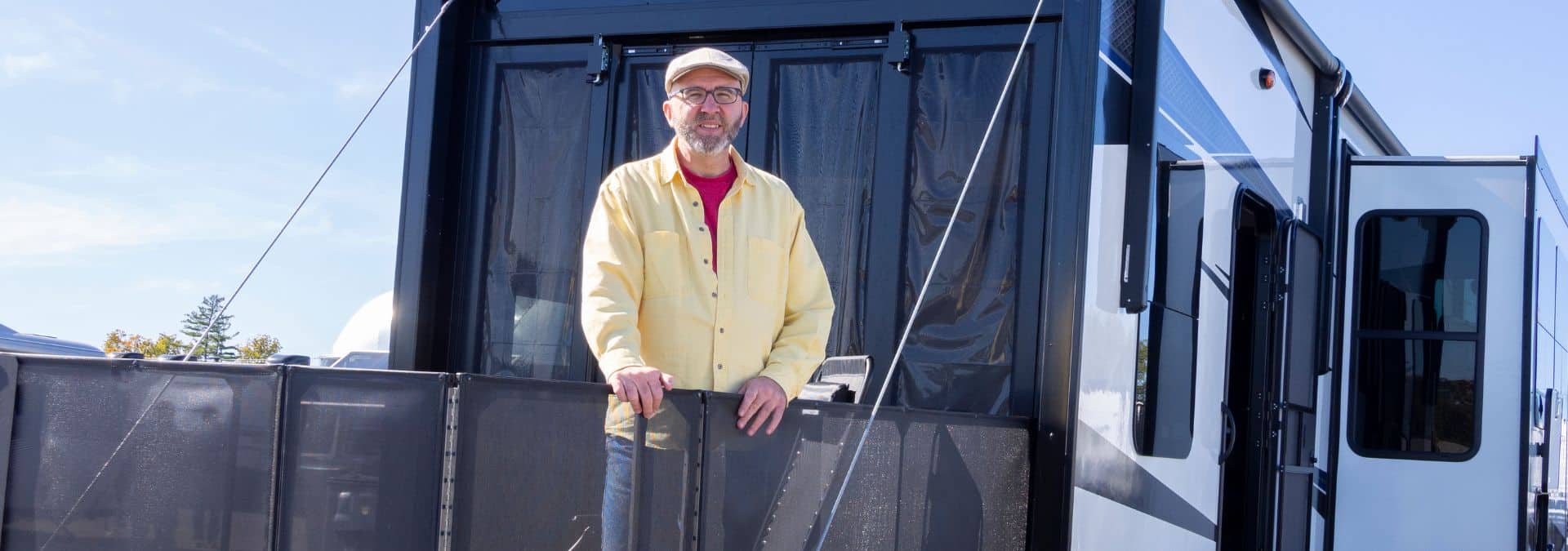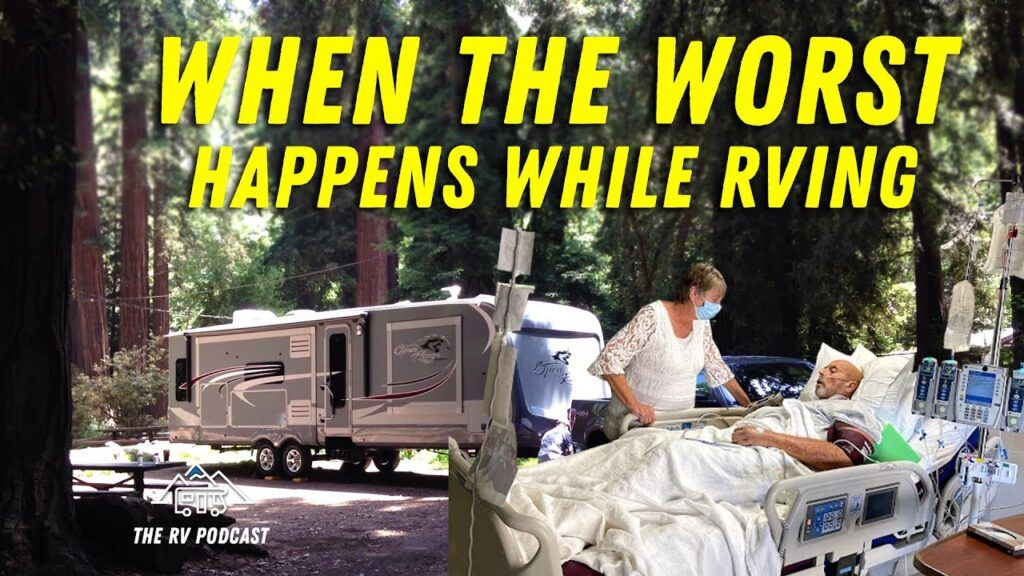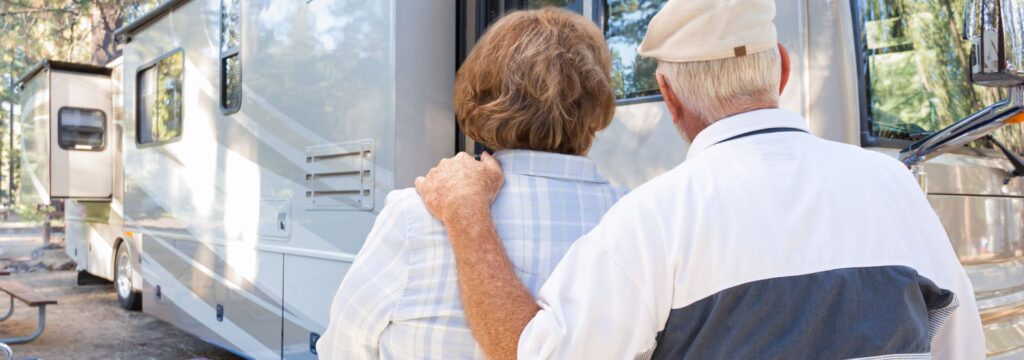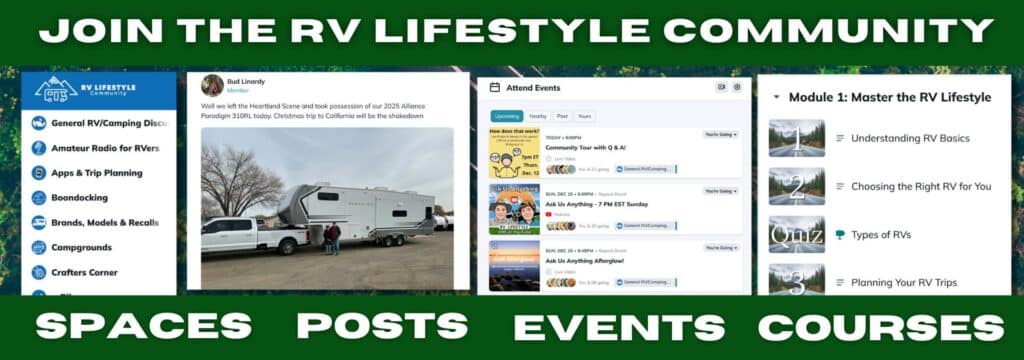Want to Retire in an RV? 5 Reasons You’ll Regret It

Jennifer and I have been RVing nearly full-time for a dozen years now. During that time, we've learned some hard truths that didn't align with our original travel dreams.
We learned some of these truths firsthand, and while we've never regretted joining the RV lifestyle, we completely understand why many do. Especially those who decide to retire in an RV.
We're going to share the biggest regrets RVers have when they retire in an RV. This will explain why we RV only nearly full-time…
Disclaimer: Please do NOT let the following scare you off from your RV dreams! Just let the following inform you and help you to plan better! (Be sure to read all the way to the end, where we share two great resources that will help you not let fear get in the way!)
Regret #1: You Sold an Asset for a Liability

When people decide to retire in an RV, many of them choose to sell their home to buy their RV and fund their travels. Some people feel they need to do this in order to make their dreams come true. And, to be fair, some people can't afford it any other way.
However, this puts retirees in a precarious situation, especially if any of the following regrets rear their ugly heads. How, you ask?
Well, when you sell your house to buy an RV, you are selling an asset that appreciates (gains value) over time for a liability that decreases in value as soon as you drive it off the lot. Buying a used RV mitigates the instant decrease in value, but it depreciates over time nonetheless.
Unless you have a strong retirement income and/or substantial savings, it can be very difficult to reverse this decision. It can be very difficult to sell an RV at a loss and buy a house in the current market.
The Solution?
Another Disclaimer: We are not financial advisors. Do your own due diligence when making financial decisions.
To avoid this regret, many RVers choose to do a cash-out refinance of their home and then rent their home for at least the first year (if not indefinitely). A cash-out refinance gives them the cash flux they need to purchase the RV, and the rental income helps cover or offset the new mortgage and RV payments.
You have to crunch the numbers, but in today's market, the rental income may very well be enough for this to work for you.
If you don't need a cash in-flux to purchase your RV, then rental income alone may cover your existing mortgage and your RV payment. Or, at least offset it enough to make your RV dream possible without selling your home.
After you experience retirement in an RV firsthand, you can decide if it's right for you. If it's not, you can easily go back to your home. If it is, you can decide to sell at that point. But, before you do, be sure to consider these other regrets that can rear their heads at any time…
Regret #2: You Didn't Budget Enough

Reality TV, vanlife influencers, etc. often make it seem like the RV lifestyle is an affordable way to retire. They make it seem like your retirement dollars will go farther in an RV.
While this can be true, it's not always true. In fact, we'd go as far as to say it's the exception to the rule for those who want to travel a lot during their retirement.
Here are examples of when retirement in an RV can be cheaper than living in a traditional house:
- You don't own your home and pay high rent
- You plan to retire in an RV park with an affordable site lease
- You plan to retire in an RV on land you own or will own
- You plan to boondock with a more fuel-efficient Class of RV
- You plan to only travel from place to place sparingly, staying long-term (a month or more) at various campsites
Here are examples of when retirement is often NOT cheaper than living in a traditional house:
- You buy an expensive RV that comes with a large monthly loan payment
- You buy a gas-guzzler RV and plan to travel (not park it and live in it)
- You buy an RV and plan to travel a lot and for long distances
- You buy a used RV that has a lot of mechanical and repair issues
- You plan to stay mostly at private campgrounds or RV resorts
The Solution?

Have a realistic understanding of the costs of RVing and budget accordingly. Be sure to research the costs according to the RV lifestyle you want. For instance, if you want to travel often vs settle into an RV park long-term.
Here are some resources that can help you understand the true cost of RVing and how to budget accordingly:
- Buying an RV: Seven Hidden Costs to Consider
- Fulltime RV Living: Count the Cost
- 5 RV Buying Tips That Will Save You from Regret!
- How to SAVE MONEY on an RV Road Trip (Top 10 Tips)
- SAVE on Gas & Diesel! (RV Fuel Discount Cards & More)
Regret #3: It's a Lot More Work Than Expected

Owning and traveling in an RV is a lot more work than some people expect. You have to stay on top of maintenance, set up and tear down camp, keep it clean inside and out, etc.
When we first started RVing, I was not a very handy man. My plan was just to pay for basic repairs and maintenance as needed. But I quickly learned that was unrealistic.
Aside from the cost of paying for basic repairs and maintenance, I learned that finding an available RV repairman to do the work can be very difficult. RV mechanics always seem to have a long backlog and thus, they can charge high prices.
I quickly realized I had to learn how to do basic RV repairs and maintenance. Furthermore, if you are a full-time RVer, every time your RV is in the shop, you are out of a home. So, be sure to factor this into your decision and your budget.
The Solution?

Be honest about how handy you are. Be realistic about your maintenance and repair budget. Practice setting up and tearing down a campsite (but keep in mind this gets easier with experience).
Here are some helpful resources:
- Preventative Maintenance Every RVer Should Do
- 45 Basic RV Maintenance Tips New RVers Should Know
- 17 Steps for QUICK RV Setup at a Campground
- RV Breakdown Checklist: How to Tear Down Your RV Setup
We also highly recommend taking this home study RV Tech Course. Parts break and many items need to be maintained, this program will show you how you can save time and money by gaining the confidence to take on the majority of the issues you’ll come across.
Regret #4: You Didn't Plan for Health Changes

This is a sad story we've heard all too often: retirees set out in their RV, excited to live out their RV dreams… only to have their health suddenly decline. Or worse, an RVer's travel companion passes away.
Now, we don't think that you should let the fear of this keep you from RVing! In fact, knowing your health can fail you at any time is a great reason to RV! But, you need to carefully consider and plan for it.
One big thing to consider when choosing an RV with your health in mind… if something happens to your travel companion, can you handle this RV yourself?
The Solution?
This is another big reason you should try not to sell your home, if possible. You may need to return to it sooner than you think. And, if we're honest with ourselves, our health will decline eventually, and you may need or want to spend your final years in a traditional home where family or caregivers can help you more easily.
Again, let us be clear on this! Most RVers do not regret pursuing their RV dreams when their health ends up having other plans. They regret not planning for their health to throw them a curve ball.
Here are some helpful resources:
- LIFE-SAVING RV Emergency Preparedness: Don’t Become a Statistic!
- 7 RV Safety Products for Seniors & RVers with Disabilities
- The Biggest Pitfall of Splitting RV Duties Down the Middle
Regret #5: The Dream Wears Off & You Went All-In

Sometimes, and for some people, the RV dream isn't all it's cracked up to be. Or, it was EXACTLY what you dreamed of… until it wasn't. Until you realized it's not something you want to do forever.
The truth is, the reality of RVing doesn't always live up to the dream. Or, the dream just doesn't last as long as you expected. That's okay! That's part of life!
But this can become a big regret if you put all of your eggs in one RV, so to speak. If you sold everything and left everything behind, you can be left with a very scary regret.
The Solution?
Just like potential regret #4, don't let the fear of the dream wearing off prevent you from pursuing it. Go after your RV dreams! BUT, plan for this possibility.
First and foremost, EASE into the lifestyle. Instead of selling everything and diving headfirst, test the waters. Gradually transition into full-time RV retirement, deciding along the way if it's really right for you.
Secondly, have a Plan B! Have a plan for if and when the dream wears off. Again, this is where you should consider renting instead of selling your home. Or, you can do as we do and only retire nearly full-time. We spend about 1/4 of our year in our sticks-and-bricks home, and that revives us for the remaining 3/4 of the year.
Now, like we said, don't let fear get in the way! Be sure to read these next two resources…
11 Insightful Ways to Embrace Being a Senior RVer
Both retirement and becoming an RVer are big steps in our lives that can come with a lot of uncertainty and even guilt. But life is nothing but a series of adjustments and recalibrations. Whenever I think about it, I think of the artificial GPS voice saying, “Recalculating!”
We recalculate when we start our jobs, our marriages, our families. And then we need to recalculate when we retire and everything that comes along with it.
For Jennifer and me, recalculating for retirement also meant recalculating for the RV lifestyle. Here are some tips to help you recalculate and embrace becoming a senior RVer… keep reading…
13 RV Camping Tips for Seniors Living Their Best Life
Like many people, Jennifer and I dreamed of becoming RVers when we retired. We made that dream a reality over a decade ago and have traveled North America for most of the year ever since.
We are big believers that senior citizens can live their best life with an RV with proper preparation and expectations. We believe it because we live it!
To help you live it, too, we have compiled some of our top RV camping tips for seniors… keep reading…

Tired of Social Media Chaos & AI Madness? Find Solace in Our Authentic RV Lifestyle Community. Over the past year, we've grown into a vibrant space where RVers connect, share trip ideas, swap tips, and troubleshoot challenges together.
Whether you're a seasoned RV traveler or just starting out, this community is the perfect place to connect with fellow explorers, share travel tips, discover amazing destinations, and learn maintenance tricks. Swap stories from the road and build lasting friendships with like-minded adventurers inside this forum-like Community. Join us https://community.rvlifestyle.com

“You buy a used RV that has a lot of mechanical and repair issues”
I want to second what Bob P. said above. 30 years ago, this was a valid strategy. Today, quality out of the factory is regularly so slipshod that it’s often preferable to buy a rig whose first owner has already had time to address all or most of its “infant mortality” issues. My 1999 TT ran right out of the box, with one or two easily-found and fixed issues. My 2019 TT? Five years later I’m still struggling with build problems.
Thanks for sharing, Harry, and so sorry to hear you are still struggling with build issues – Team RV Lifestyle
I found your article to almost be spot on. As a senior full-time rv’er who is also a rv tech I would have to disagree on buying a used unit, through my experience new is not the way to go, these rv’s aren’t like buying a vehicle, new rv’s are consintantly in the shop getting warranty work done, used ones usually have all the bugs worked out of them, new or used I recommend a third party inspection. Courses like you described can save a lot of headaches, the NRVTA has a great course for the consumer.
Thanks for sharing, Bob! Team RV Lifestyle